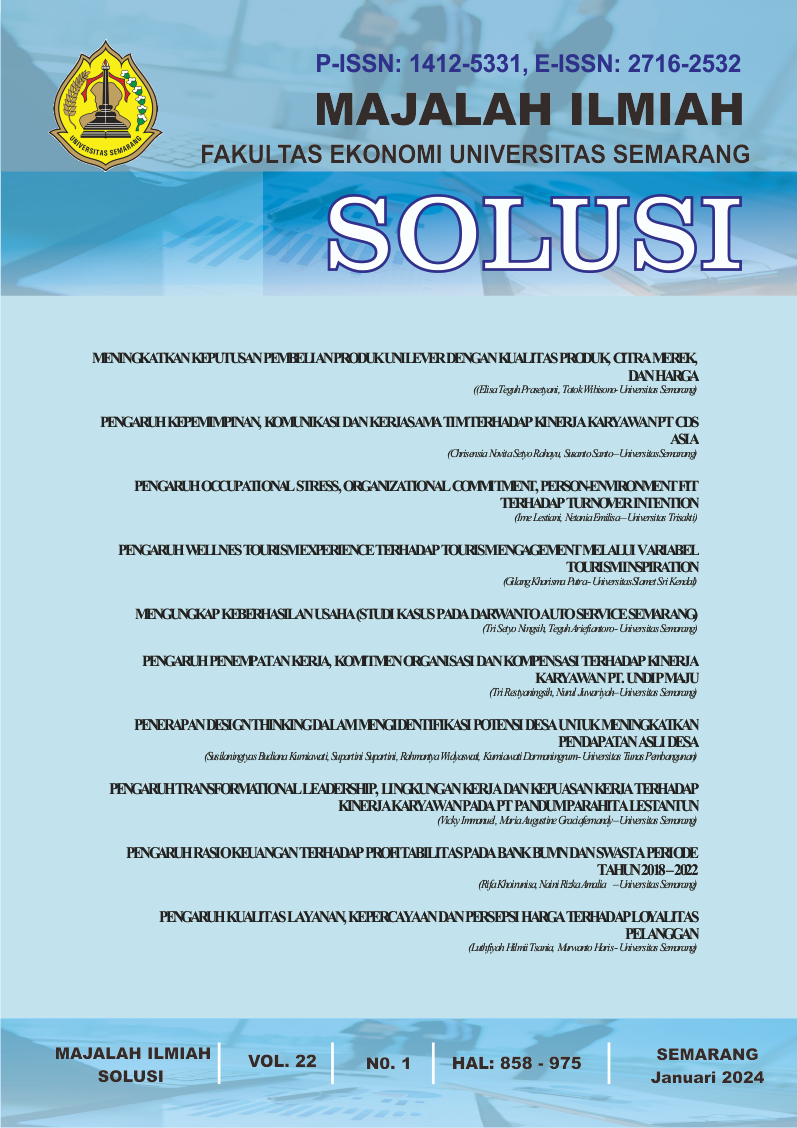PENGARUH WELLNES TOURISM EXPERIENCE TERHADAP TOURISM ENGAGEMENT MELALUI VARIABEL TOURISM INSPIRATION
DOI:
https://doi.org/10.26623/slsi.v22i1.8314Keywords:
Wellness tourism experience, Tourism inspiration, Tourism engagement.Abstract
The aim of this research is to test whether wellness tourist expertise can create tourist engagement behavior. We also tried to add the tourist inspiration variable as a mediating variable.This research uses a quantitative research methodapproach. Using a purposive sampling method in the sampling technique, where the samples taken will later be filtered based on certain criteria. The sample criteria in this research are visitors to the Medini Kendal Regency tourist attraction who have visited more than 3 times. Based on these criteria, a sampling of 77 visitors was selected. This research uses primary data, where this data was obtained directly. Based on the table of hypothesis test processing results above, the relationship between the tourist wellness experience variable and tourist engagement is with a t statistic of 2.255 and a p value of 0.024. These results show that the wellness tourist experience variable has a positive and significant influence, the relationship between the tourist inspiration variable and tourist engagement with a t statistic of 6.717 and a p value of 0.000. These results show that the tourist inspiration variable has a positive and significant influence on tourist engagement. The relationship between the wellness tourist experience variable and tourist inspiration with a t statistic of 17.256 and a p value of 0.000. These results show that the wellness tourist experience variable has a positive and significant influence on tourist inspiration. The role of the tourist inspiration variable in mediating the relationship between the wellness tourist experience variable and tourist engagement with a t statistic of 5.965 and a p value of 0.000. These results show that tourist inspiration is able to mediate the relationship between the tourist wellness variable and the tourist engagement variable
References
Anannukul, N., & Yoopetch, C. (2022). The determinants of intention to visit wellness tourism destination of young tourists. Kasetsart Journal of Social Sciences, 43(2), 417–424. https://doi.org/10.34044/j.kjss.2022.43.2.20
Brown, G. (2006). Mapping Landscape Values and. Tourism, 113(November 2012), 101–113. https://doi.org/10.1002/jtr
Chen, X., Li, W., & Joo, D. (2021). Literary celebrity, tourists’ self-destination connection, and brand engagement: Based on a marketing perspective of celebrity endorsement effects. Journal of Hospitality and Tourism Management, 48(May), 230–239. https://doi.org/10.1016/j.jhtm.2021.06.013
Csirmaz, É., & Pető, K. (2015). International Trends in Recreational and Wellness Tourism. Procedia Economics and Finance, 32(15), 755–762. https://doi.org/10.1016/s2212-5671(15)01458-6
Dillette, A. K., Douglas, A. C., & Andrzejewski, C. (2021). Dimensions of holistic wellness as a result of international wellness tourism experiences. Current Issues in Tourism, 24(6), 794–810. https://doi.org/10.1080/13683500.2020.1746247
Garrison, S., & Wallace, C. (2021). Media tourism and its role in sustaining Scotland’s tourism industry. Sustainability (Switzerland), 13(11). https://doi.org/10.3390/su13116305
Gordon, J. E., & Baker, M. (2016). Appreciating geology and the physical landscape in Scotland: From tourism of awe to experiential re-engagement. Geological Society Special Publication, 417(1), 25–40. https://doi.org/10.1144/SP417.1
Hair, J. F., Sarstedt, M., Hopkins, L., & Kuppelwieser, V. G. (2014). Partial least squares structural equation modeling (PLS-SEM): An emerging tool in business research. European Business Review, 26(2), 106–121. https://doi.org/10.1108/EBR-10-2013-0128
He, M., Liu, B., & Li, Y. (2023). Tourist Inspiration: How the Wellness Tourism Experience Inspires Tourist Engagement. Journal of Hospitality and Tourism Research, 47(7), 1115–1135. https://doi.org/10.1177/10963480211026376
Hoogendoorn, G., & Hammett, D. (2021). Resident tourists and the local “other.” Tourism Geographies, 23(5–6), 1021–1039. https://doi.org/10.1080/14616688.2020.1713882
Khoi, N. H., Le, A. N. H., & Tran, M. D. (2021). Tourist inspiration and its consequences: The moderating role of neuroticism. International Journal of Tourism Research, 23(5), 901–913. https://doi.org/10.1002/jtr.2452
Khoi, N. H., Phong, N. D., & Le, A. N. H. (2020). Customer inspiration in a tourism context: an investigation of driving and moderating factors. Current Issues in Tourism, 23(21), 2699–2715. https://doi.org/10.1080/13683500.2019.1666092
Kline, C., Benjamin, S., Wagner, K. M., & Dineen, M. (2022). Tourism as a Demand Reduction Strategy for Pangolin Trafficking: Inspiring an Ethic of Care among College Students. Journal of Hospitality and Tourism Education, 34(3), 199–209. https://doi.org/10.1080/10963758.2020.1726770
Koncul, N. (2012). Wellness: A new mode of tourism. Ekonomska Istrazivanja, 25(2), 525–534. https://doi.org/10.1080/1331677X.2012.11517521
Lee, J., & Kim, J. J. (2023). A Study on Market Segmentation According to Wellness Tourism Motivation and Differences in Behavior between the Groups—Focusing on Satisfaction, Behavioral Intention, and Flow. International Journal of Environmental Research and Public Health, 20(2), 1–22. https://doi.org/10.3390/ijerph20021063
Liu, L., Zhou, Y., & Sun, X. (2023). The Impact of the Wellness Tourism Experience on Tourist Well-Being: The Mediating Role of Tourist Satisfaction. Sustainability (Switzerland), 15(3), 1–23. https://doi.org/10.3390/su15031872
Lopes, M. (2022). Can Volunteer Tourism be a sub-segment of Wellness Tourism? International Conference on Tourism Research, 15(1), 208–215. https://doi.org/10.34190/ictr.15.1.300
Nel-lo Andreu, M. G., Font-Barnet, A., & Espasa Roca, M. (2021). Wellness tourism-new challenges and opportunities for tourism in Salou. Sustainability (Switzerland), 13(15), 1–13. https://doi.org/10.3390/su13158246
Phuthong, T., Anuntavoranich, P., Chandrachai, A., & Piromsopa, K. (2022). Mapping Research Trends in Mobile Technology in Wellness Tourism Destination: a Bibliometric and Visualized Analysis. Geojournal of Tourism and Geosites, 45(4SPL), 1693–1705. https://doi.org/10.30892/gtg.454spl19-990
Rasoolimanesh, S. M., Khoo-Lattimore, C., Md Noor, S., Jaafar, M., & Konar, R. (2021). Tourist engagement and loyalty: gender matters? Current Issues in Tourism, 24(6), 871–885. https://doi.org/10.1080/13683500.2020.1765321
Sigala, M., & Robinson, R. N. S. (2018). Management and marketing of wine tourism business: Theory, practice, and cases. In Management and Marketing of Wine Tourism Business: Theory, Practice, and Cases. Springer International Publishing. https://doi.org/10.1007/978-3-319-75462-8
Zailani, N., Albattat, A., Yee, W. S., Nazri, M., & ... (2021). Tourist Motivation Factors Towards Health and Wellness Tourism in Malaysia. 640(September). https://www.researchgate.net/profile/Farah-Zailani/publication/351782317_Tourist_Motivation_Factors_Towards_Health_and_Wellness_Tourism_in_Malaysia/links/615426c739b8157d9004df85/Tourist-Motivation-Factors-Towards-Health-and-Wellness-Tourism-in-Malaysia.p
Downloads
Additional Files
Published
Issue
Section
License
The author who will publish the manuscript at Solusi : Journal of Solusi, agree to the following terms:
|













 This work is licensed under a
This work is licensed under a 